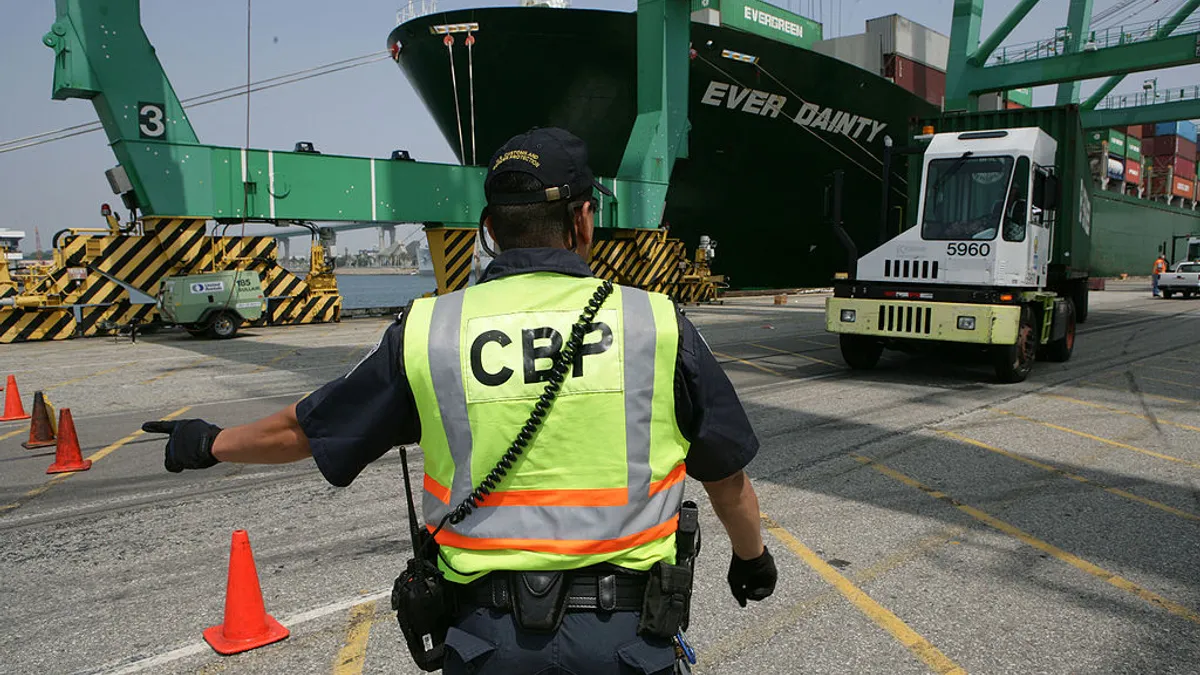Dive Brief:
- Customs and Border Protection will launch a new Section 321 Data Pilot on Aug. 22 aimed at increasing data collection on e-commerce shipments for security purposes. The pilot is voluntary for shippers and carriers shipping packages via air, rail or truck and allows CBP to collect additional origin, content, tracking and recipient information on cross-border shipments with import values less than $800. The pilot will not cover packages carried via the postal service or ocean freight, or that are destined for a foreign trade zone.
- Section 321 of the Tariff Act of 1930 covers items imported by one person on one day with a retail value of less than $800, exempting them from tariffs. With the significant increase in e-commerce shipments falling under this category, the agency says it "does not receive adequate advance information in order to effectively and efficiently assess the security risk of the approximately 1.8 million Section 321 shipments that arrive each day."
- To address this, CBP seeks to work with online marketplaces, shippers and carriers who are willing to provide additional security and content information about their cargo upfront. The agency plans to cross-reference this data with photos and X-ray images of the packages to better identify potentially dangerous items crossing the border ahead of time.
Dive Insight:
CBP gets some basic information from air, rail and truck carriers bringing parcels over the border, such as package tracking numbers; however, this is often insufficient to identify the entity shipping or receiving the package, or its contents, thereby increasing the risk of illicit materials being sent into the country before CBP can catch them.
In the agency's E-commerce Strategy, released in March, it says its current security policies are designed, and most effective for, tracking threats in containerized shipments. High-volume, small package e-commerce shipments are more likely to fall through the cracks. In the strategy report, CBP cited two separate instances where drugs and explosives were intercepted in small shipments of printer cartridges and other innocuous consumer items.
Each shipper, carrier and authorized freight or customs brokers involved in the new pilot has an assigned "originator code" in CPB's digital system, allowing them to securely submit information about shipment origins, contents and recipients. Currently, according to the Federal Register, these entities must provide their originator code, the participant filer type (carrier, online marketplace, etc.), the mode of transportation and either the item's tracking number, house bill number or master bill number. Under the new pilot, participating shippers, carriers and online marketplaces would provide additional information including enhanced product descriptions, the name and address for the final recipient, product photos, and security scan images.
While there is no upfront cost, the agency estimates participants may have to spend additional time and resources on gathering and submitting the required information efficiently, depending on their existing structures. In return, CBP says it may "expedite clearances for low-risk Section 321 shipments when sufficient test data has been received prior to the shipment's arrival."
Given the increasing importance of fast and reliable shipping for e-commerce businesses, the potential to swap additional data for expedited border clearance could be attractive to some firms as trade volatility has periodically caused serious delays at ports of entry over the past year.
After roughly one year, CBP plans to evaluate the results of the program to determine whether the advance data collection is necessary or significantly helpful in evaluating threats in 321 shipments.













